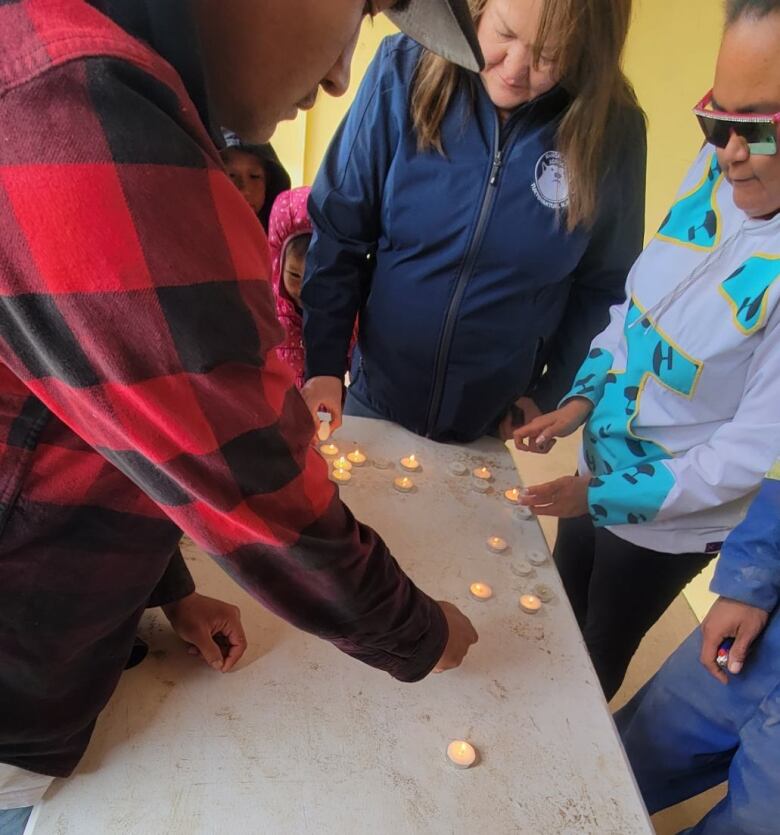'A long heartbreak': Tuktoyaktuk vigil calls for greater mental health supports
‘There are people in our community that are there for you,’ says organizer

WARNING: This story discusses suicide.
Over 100 community members gathered for a vigil in Tuktoyaktuk, N.W.T., last month, to remember the lives of two young men in the community. Both took their own lives recently.
"Suicide deeply affects the whole community," said Katrina Cockney, who organized the July 13 event. "We wanted to come together to light candles and show how, as a community, we can get through anything together."
The organizers believe the vigil was one of the first of its kind. They held it hoping to inspire momentum for change.
Cockney said it's to help people know they can make it out of difficult times, and "that your problems don't last forever."
"We do care. There are people in our community that are there for you, whether it be … listening or giving advice, or just a shoulder to cry on," she said.
"It just goes to show that when a community comes together, there's nothing we can't do."
Cockney, who works for the Hamlet of Tuktoyaktuk, wants to see better followup and permanent support for people struggling with mental health issues, and said the event had an impact.
"It's sparked something in our community," she said. "Elders came to me saying that this needs to happen more often."
"That we shouldn't just have something like this when a tragedy happens in our community. It should be continuous support throughout the year."

Community speakers at the vigil included family members of those who died, elders, community supports Julia and Roy Cockney, Mayor Erwin Elias, and MLA Jackie Jacobson.
'Nobody should feel alone ever'
The vigil was also personal for Cockney and her sister Jocelyn Noksana.
They lost their 12-year-old sister 21 years ago, and both want to see more community members participate in life promotion and suicide prevention training.
"I just really want to make sure that nobody ever goes through that. It's a long heartbreak," Cockney said.
"Nobody should feel alone ever."
The N.W.T. saw 10 recorded suicides in 2020, all male, according to the N.W.T. Coroner Service 2020 annual report. Three were within the Beaufort Delta.
In its 10-year review from 2011 to 2020, the coroner recorded 99 deaths by suicide in the territory, or 10 per cent of all deaths reported. The Beaufort Delta has the second highest number of suicides in that time frame, with 33, behind the North Slave region, which saw 34 deaths by suicide.
Cockney wants to see permanent support persons and locations to support trauma and addictions. She remembers a building in the 1990s called "The House of Hope" that ran out of funding and closed.
She said the largest problem she sees is the lack of followup for the current health and support models where people either go out of the community for help or support workers come into the community.
The importance of listening
Fifteen-year-old Isabella Anara King of Tuktoyaktuk agrees.
She said she became passionate about mental health and suicide prevention after learning about residential schools and intergenerational trauma.

She spoke about suicide last May at the N.W.T. legislature's youth model parliament.
"Truly listen ... if they're trying to give out signals," she said in an interview. "You can't make people's decisions for them. You can't force them to go to counselling or therapy or on the land camp. The best thing you can truly truly do … is listen."
She said she recognizes some people may not yet feel comfortable sharing, but she has advice from her own experience.
"No one can really truly take the first step for you," she said. "If you truly are having difficulty speaking to someone … get a journal and write down your feelings until you actually feel comfortable to talk to someone.

"It could be hard but maybe they're feeling the same way too and you never know, it could even help someone not feel alone or feeling like you."
King said even she is dealing with the "the after effects of all that trauma and pain and suffering," which has left no one untouched.
"Indigenous children and teenagers need that help or maybe even a push forward, more access to resources," she said.
In the meantime the hamlet has partnered with the Tuktoyaktuk Community Corporation and Jason Jacobson Youth Centre to coordinate baseball tournaments there and in Inuvik, and has opened their arena for free play from 6 p.m. to midnight until school begins.

